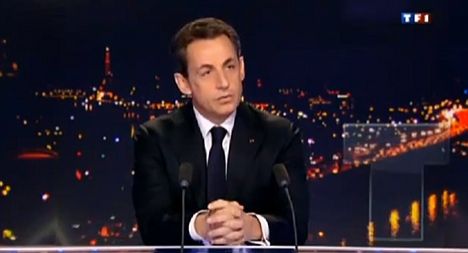“If he had financed it, I wasn’t very grateful,” Sarkozy said sarcastically, in an apparent reference to the active role that France played in the NATO campaign that led to the strongman’s ouster.
Sarkozy is in the midst of a tight election battle with Socialist rival Francois Hollande and spoke during an interview with TF1 television less than six weeks before the first-round of voting on April 22nd.
On Monday the Mediapart site, a respected source seen as opposed to Sarkozy’s right-wing government, published the report which is based on testimony by a former doctor of a French arms dealer who is alleged to have arranged the campaign donation of up to €50 million ($65 million).
AFP has been unable to confirm the authenticity of the document, but the report has revived long-running allegations that French political camps have benefited financially from kickbacks on arms deals with foreign regimes.
Qaddafi’s son and heir apparent Saif al-Islam last year claimed that Libya financed Sarkozy’s campaign, after Paris abandoned its improving ties with Libya and threw its weight behind the rebellion that eventually deposed and killed the dictator.
“Sarkozy must first give back the money he took from Libya to finance his electoral campaign. We funded it and we have all the details and are ready to reveal everything,” Saif told the Euronews network.
When asked about Saif’s comments during Monday’s interview, Sarkozy replied: “I am sorry to see you in the role of a spokeswoman for Qaddafi’s son, frankly I’ve known you in better roles.”
“It’s grotesque and I am sorry that I am being interrogated about declarations of Qaddafi or his son on an important channel like TF1,” Sarkozy said.
“When one quotes Mr. Qaddafi, who is dead, his son, who has blood on his hands, that is a regime of dictators, assassins, whose credibility is zero… frankly, I think we have sunk low enough in the political debate.”
The report published by Mediapart was written by private operative Jean-Charles Brisard based on testimony from a former doctor of Ziad Takieddine — a French arms dealer who is already under investigation and who allegedly arranged the campaign donation with Saif.
In his report he alleges “the modalities of the financing of the campaign” of “NS” were “settled during the visit to Libya of NS + BH” on October 6, 2005. “Campaign finance totally settled,” he adds.
The initials “NS” are alleged to refer to Sarkozy, while “BH” to Brice Hortefeux, the former interior minister and longtime Sarkozy ally who is currently a close adviser to the French leader’s current re-election bid.
Contacted by AFP, Brisard refused to make any comment.
Takieddine, interviewed by the news channel France 24, denied the allegations outright. “There’s nothing at all like that,” he said.
Brisard is reported to have been a figure in Edouard Balladur’s failed 1995 presidential campaign — for which then budget minister Sarkozy was spokesman — and now the director of a private business intelligence company.




 Please whitelist us to continue reading.
Please whitelist us to continue reading.
Member comments